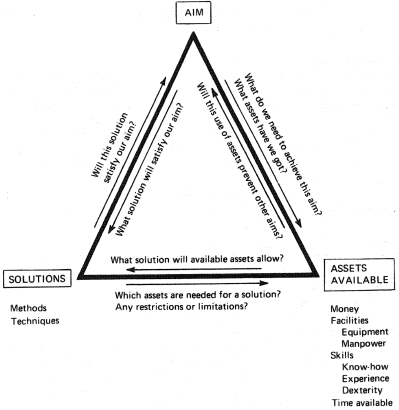Is Planning Really Necessary?
Planning involves your making decisions, organizing, and coordinating the various elements that contribute to the production.
Unplanned production
For simple productions, it is possible with experience and a modicum of luck to ‘work things out as you go’, and create from scratch on the day. While scenery is being erected and lit, you walk the camera and sound crew round the setting, explaining the action and probable shots, and then rehearse.
But don’t rely on this approach. At best it is makeshift. If you suddenly decide that you need three matching chairs instead of two, or a low glass-topped table, they may not be available unless you happen to have a sizeable property store to draw on.
Even where you cannot organize in detail beforehand, you can still develop a working scheme to relate to.
No need to plan
When a production follows a regular recurrent format, such as a daily talks show, and everyone involved, is familiar with the shots and action, continual planning is not really necessary. Just inform the team of any variations or differences in that day’s show.
Plan to make it happen
Planning may seem at first to be a restrictive chore. But it pays dividends! Without a clear idea of how you want to present your subject, and some preliminary planning, you have an empty studio, or a crew wondering what to do! If you rely on happenstance, results will be unpredictable, and usually disappointing. The end product could even prove to be a sad waste of time, money and effort.
Planning principles
Careful planning helps the director to work out how he/she is going to treat the subject in picture and sound, and to arrange talent and facilities to achieve this. The basis of most planning is typically:
• A script (full or outline) giving details of the production.
• A running order showing the order of scenes, items or acts.
• A scale plan of the studio, with outlines of proposed settings.
• Sketches and/or a storyboard’ giving a pictorial idea of the shots and treatment.
Well in advance of the scheduled rehearsal/recording dates, the director meets with the various specialists responsible for all aspects of the production, and outlines his/her ideas. They in turn offer their individual expertise, evaluate and extend these ideas, anticipate problems, and go on to organize their contributions to the show.
HOW TO PLAN
The planning process
The problem is where to begin! This ‘universal problem-solving circuit’ helps us to think coherently about planning procedures. Whenever we have a problem, we must relate any potential solution to our assets, or the result will be unsuccessful. Note how the circuit works clockwise and anti-clockwise. There is often no correct solution, only an optimum for your needs.

